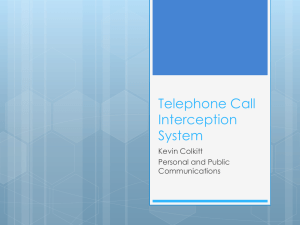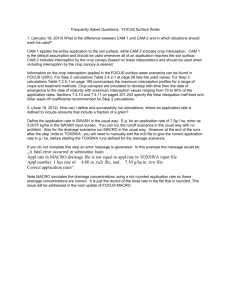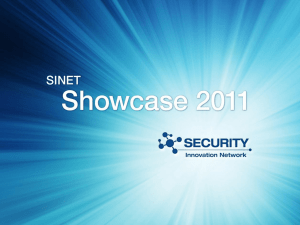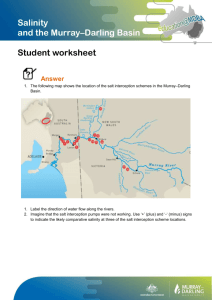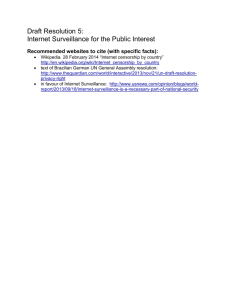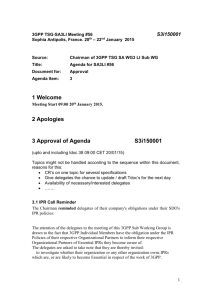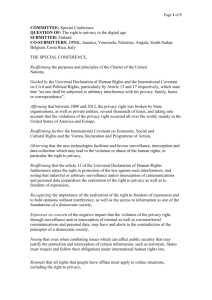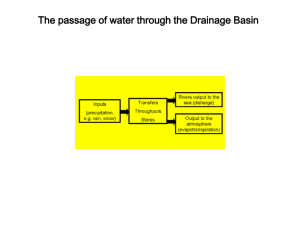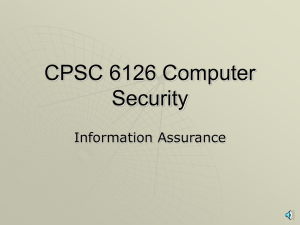interception
advertisement
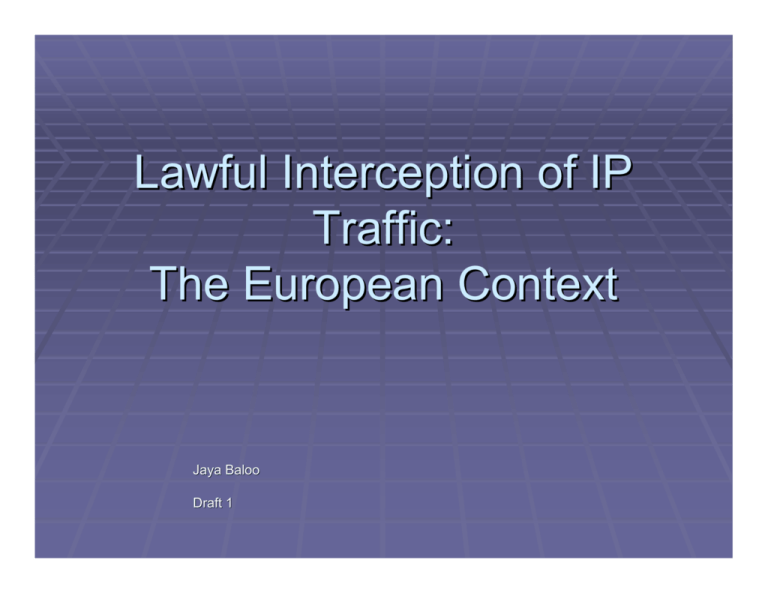
Lawful Interception of IP Traffic: The European Context Jaya Baloo Draft 1 Contents § Introduction to Lawful Interception § Interception of Internet services § Origins in The European Community § The European Interception Legislation in Brief § ETSI § The Dutch TIIT specifications § Interception Suppliers & Discussion of Techniques § Future Developments & Issues Introduction to Lawful Interception § ETSI definition of (lawful) interception: § interception: action (based on the law), performed by an network operator/access provider/service provider (NWO/AP/SvP), of making available certain information and providing that information to a law enforcement monitoring facility. LI order Network Operator, Access Provider or Service Provider Deliver requested information Law Enforcement Agency (LEA) Law Enforcement Monitoring Facility LIÕs Raison DÕetre § Why intercept? § § § § § Terrorism Pedophilia rings Cyber stalking Data theft ÐIndustrial espionage Drug dealers on the internet § Why not? § Privacy § Security Legal Issues in LI § Judge: "Am I not to hear the truth?" Objecting Counsel: "No, Your Lordship is to hear the evidence." § Some characteristics of evidence- relevance to LI § Admissible Ð can evidence be considered in courtÐ *differs per country § Authentic Ð explicitly link data to individuals § Accurate Ð reliability of surveillance process over content of intercept § Complete Ð tells a ÒcompleteÓ story of a particular circumstance § Convincing to juries Ð probative value, and subjective practical test of presentation Admissibility of Surveillance Evidence § Virtual Locus Delecti § Hard to actually find criminals in delicto flagrante § How to handle expert evidence? Juries are not composed of network specialists. Legal not scientific decision making. § Case for treating Intercepted evidence as secondary and not primary evidence § Primary Ð is the best possible evidence Ð e.g. in the case of a document Ð its original.Ê § Secondary Ð is clearly not the primary source Ð e.g. in the case of a document Ð a copy. Interception of Internet services Interception of Internet services What are defined as Internet services? § access to the Internet § the services that go over the Internet, such as: § surfing the World Wide Web (e.g. html), § e-mail, § chat and icq, § VoIP, FoIP § ftp, § telnet What about encrypted traffic? § § § § Secure e-mail (e.g. PGP, S/MIME) Secure surfing with HTTPS (e.g. SSL, TLS) VPNs (e.g. IPSec) Encrypted IP Telephony (e.g. pgp -phone and Nautilus) § etc. § If applied by NWO/AP/SvP then § encryption should be stripped before sending to LEMF or § key(s) should be made available to LEA else § a challenge for the LEA Logical Overview Technical Challenges § Req. ÐMaintain Transparency & Standard of § § § § § § Communication Identify Target - Monitoring Radius Ð misses disconnect Capture Intercept information Ð Effective Filtering Switch Packet Reassembly Email Intercept Ð TCP Sequencing Ð Protocol Reassembly Software complexity increases bugginess Peering with LEMF Origins in The European Community What is LI based on in the EU? § Legal Basis § EU directive § Convention on Cybercrime Ð Council of Europe§ Article 20- Real time collection of traffic data § Article 21- Interception of content data § National laws & regulations § Technically § Not Carnivore § Not Calea § Standards, Best Practices based approach § IETFÕs standpoint (RFC 2804 IETF Policy on Wiretapping ) The European Interception Legislation in Brief Solution Requirements European Interception Legislation § France § Commission Nationale de Contr™le des Interceptions de SŽcuritŽ -- La loi 91-636 § Loi sur la Securite Quotidienne Ð November 2001 § Germany § G-10 - 2001 § The Counter terrorism Act Ð January 2002 § Ireland § Interception of Postal Packets and Telecommunications Messages (Regulation) Act. UK Interception Legislation § UK § Regulation of Investigatory Powers Act 2000 § Anti-terrorism, Crime and Security Act 2001 § ÒThe tragic events in the United States on 11 September 2001 underline the importance of the ServiceÕs work on national security and, in particular, counter-terrorism. Those terrible events significantly raised the stakes in what was a prime area of the ServiceÕs work. It is of the utmost importance that our Security Service is able to maintain its capability against this very real threat, both in terms of staff and in terms of other resources. Part of that falls to legislation and since this website was last updated we have seen the advent of the Regulation of Investigatory Powers Act 2000, Terrorism Act 2000 and the Anti-Terrorism Crime and Security Act 2001. Taken together these Acts provide the Security Service, amongst others, with preventative and investigative capabilities, relevant to the technology of today and matched to the threat from those who would seek to harm or undermine our society. Ò Ð The UK Home SecretaryÕs Foreword on www.MI5.gov The Case in Holland § At the forefront of LI : both legally & technically § The Dutch Telecommunications Act 1998Ð Operator Responsibilities § The Dutch Code of Criminal Proceedings Ð Initiation and handling of interception request § The Special Investigation Powers Act -streamlines criminal investigation methods § LIO Ð National Interception Office Ð in operation at the end of 2002 § CIOT Ð central bureau for interception for telecom European Telecommunications Standards Institute Technical Specs. of Lawful Interception The ETSI model LEA domain NOW / AP / SvPÔs domain NWO/AP/SvPÕs administration function HI1 intercept related information (IRI) Network Internal Functions content of communication (CC) IRI mediation function CC mediation function IIF HI2 HI3 LEMF INI LI handover interface HI HI1: administrative information IIF: internal interception function HI2: intercept related information INI: internal network interface HI3: content of communication ETSI § Purpose of ETSI LI standardization Ð Òto facilitate the § § § § § § economic realization of lawful interception that complies with the national and international conventions and legislation Ò Enable Interoperability Ð Focuses on Handover Protocol Formerly ETSI TC SEC LI Ð working group Now ETSI TC LI Ðseparate committee standards docs. Handover Spec Ð IP Ð expected in 2003-04-01 Comprised primarily of operators and vendors - WG LI ETSI TR 101 944 Ð The Issues ETSI TR 101 944 § Responsibility- Lawful Interception requirements must be addressed separately to Access Provider and Service Provider. § 5 layer model - Network Level & Service Level division § Implementation Architecture Ð § Telephone cct. (PSTN/ISDN) § Digital Subscriber Line (xDSL) § Local Area Network (LAN) § Permanent IP Address § Security Aspects § HI3 Delivery 3GPP, GPRS, UMTS § Work carried out by TSG SA WG3 LI § Mission- ÒDetail the reqs. for LI in UMTS, and produce all § § § § § specifications needed to meet those requirements. This work shall be performed in conjunction with the regional standards bodies.Ó ETSI TS 133 106 Ð Lawful Interception Requirements ETSI TS 133 107 Ð Lawful Interception Architecture & Functions ETSI TS 133 108 Ð Handover Interface for Lawful Intercept Manufacturers already capable Ð Nokia, Ericcson Interception via SIP The Dutch TIIT specifications The TIIT § WGLI § The Players § The End Result V.1.0 § The deadlines Ð Full IP & Email Ð2002 § NLIP § Costs § ISP Challenge TIIT § User (LEA) Requirements for transport § Description of Handover Interface § HI1: method depends on LEA, but also contains crypto keys § HI2: events like login, logout, access e-mailbox, etc. § HI3: Content of Communication and additional generated information (hash results and NULL packets) § Description of General Architecture for HI2 and HI3 § Handover Interface specification § § § § Global data structures S1 Ð T2 Traffic Definition Data structures and message flows for HI2 and HI3 Use of cryptography TIIT General Architecture for HI2 and HI3 S1 interception T1 S1 interception S2 gathering & transport HI2 & HI3 T2 (LEA1) T1 T2 (LEA2) S1 interception Mediation Function S3 management box T1 Internet Law Enforcement Monitoring Facility (LEMF) ISP LI Warrant Admin Desk Law Enforcement Agency (LEA) LI order HI1 TIIT General Architecture for HI2 and HI3 S1 interception T1 S1 interception S2 gathering & transport HI2 & HI3 T2 (LEA1) T1 T2 (LEA2) S1 interception Mediation Function S3 management box T1 Internet S1: § Intercept target traffic § Time stamp target packets § Generate SHA hash over 64 target packets § Encrypt with key specific for this interception § Send to S2 Law Enforcement Monitoring Facility (LEMF) S2: ¥Collect target packets from authenticated S1s ¥Distribute target packet randomly over the T1s over a TLS or IPsec channel ¥Use X.509 certificates for mutual authentication TIIT - General Architecture for HI2 and HI3 S1 interception T1 S1 interception S2 gathering & transport HI2 & HI3 T2 (LEA1) T1 T2 (LEA2) S1 interception Mediation Function S3 management box T1 Internet § S3 is not really TIIT § Management system for § § § Starting & stopping interceptions Collect billing data Etc. Law Enforcement Monitoring Facility (LEMF) TIIT - General Architecture for HI2 and HI3 S1 interception T1 S1 interception S2 gathering & transport HI2 & HI3 T2 (LEA1) T1 T2 (LEA2) S1 interception Mediation Function S3 management box § T1s: § End TLS or IPsec channel(s) § Forward data to T2(s) of the LEA that ordered the interception T1 Internet Law Enforcement Monitoring Facility (LEMF) § T2: § Decrypt packets from S1s § Check integrity Interception Suppliers & Discussion of Techniques LI Implementations § § § § § § Verint formerly known as Comverse Infosys ADC formerly known as SS8 Accuris Pine Aqsacom Digivox § Telco/ ISP hardware vendors § § § § Siemens Alcatel Cisco Nortel Implementation techniques § Active- direct local interception Ð i.e. Bcc: § Semi-Active- interaction with Radius to capture and filter traffic per IP address § Passive- no interaction with ISP required only interception point for LEA device § Most of the following are active or a combination of active and semi-active implementations Verint = Comverse - Infosys § Based in Israel Ð Re : Phrack 58-13 § Used by Dutch LEMF § Used extensively internationally Ð supports CALEA & ETSI § Use of Top Layer switch ADC = SS8 § Use of proprietary hardware § Used for large bandwidth ccts. § Known to be used in Satellite Traffic centers § Supports CALEA Ð ETSI § Use of Top Layer switch Accuris § Max. of 50 concurrent taps § Solution not dependant on switch type § Can use single s2 as concentrator § Offer Gigabit Solution Ð but depends on selected switch capability and integration with filter setting § Supports Calea & ETSI ItÕs all about the M$ney § Solutions can cost anywhere from 100,000 Euro to 700,000,000 Euro for the ISP § UK Govt. expected to spend 46 billion over the next 5 years- subsequently reduced to 27 billion § Division of costs § Cap Ex = ISP § Op Ex = Govt. § Penalties for non-compliance § § § Fines Ð up to 250,000 euros Civil Charges House Arrest of CEO of ISP § Cooperation between ISPs to choose single LI tool Conclusions for Law Enforcement § ÒIf youÕre going to do it É do it rightÓ § § § § § Disclosure of tools and methods Adherence to warrant submission requirements Completeness of logs and supporting info. Proof of non- contamination of target data Maintaining relationship with the private sector § § § § Training Defining role of police investigators Defining role of civilian technicians Handling Multi Ð Focal investigations § Law Enforcement personnel Future Developments & Issues § § § § § § § § § EU Expansion Ð Europol stipulations Data Retention Decisions ENFOPOL organization Borderless LI ISP Role EU wide agreements on Intercept Initiation Internet Access over Mobile WLAN challenges The Future of Privacy Legislation ? Web Sites § www.opentap.org § http://www.quintessenz.at/cgi§ § § § § § § bin/index?funktion=doquments www.phrack.com www.cryptome.org www.statewatch.org www.privacy.org www.infowar.org www.reglaw.co.uk *caveat Ð org ? com Q&A / Discussion § Does LI deliver added value to Law EnforcementÕs ability to protect the public? § What about open source Interception tools? § Will there be a return of the Clipper Chip? § Should there be mandated Key Escrow of ISPÕs encryption keys? § What types of oversight need to be built into the system to prevent abuse? Thank You. Jaya Baloo jaya@baloos.org +31-6-51569107
